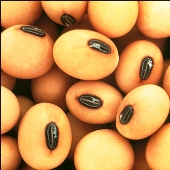 Soyabean oil, manufactured from genetically-modified soyabeans, may very much have become part of the food chain, even as activists and scientists remain engaged in an increasingly ugly debate over the moratorium on commercial cultivation of Bt brinjal, a genetically-modified version of the vegetable.
Soyabean oil, manufactured from genetically-modified soyabeans, may very much have become part of the food chain, even as activists and scientists remain engaged in an increasingly ugly debate over the moratorium on commercial cultivation of Bt brinjal, a genetically-modified version of the vegetable.
The environment ministry says if GM soyabean oil is indeed coming into the country, it should be labelled.
"All genetically-modified products being imported into the country should be labelled as such, under the law. If it is not being done, it is illegal," said environment minister Jairam Ramesh.
Ramesh agreed that soyabean oil constituted 32-35 per cent of the total oil imports.
Almost all of this soya oil came from countries like Argentina and the US, which are the major producers of GM soya. Ramesh, however, said: "We don't know what proportion of the oil comes from GM soya."
For the past few years, debate has been on among the ministries of agriculture, commerce, food and health. First, the food ministry raised the issue that restrictions could be imposed on the import of soyabean oil produced out GM soyabean and made a reference to the law ministry, and then to the health ministry, to examine.
Subsequently, the food ministry ruled out the possibility of any restriction on soyabean oil under the apprehension that it would give Malaysian palm oil an upper hand in India.
However, on April 7, 2006, the government amended the Foreign Trade (Development & Regulation) Act, 1992, governing rules on import of genetically-modified crops.
According to the amendment, imports of genetically-modified organisms for food, feed or processing, industrial processing, research and development for commercialisation or environmental release would be allowed only with the approval of the Genetic Engineering Approval Committee.
At the same time, all shipments, including products containing GMOs, have to carry a declaration saying the product is genetically modified.
If the shipment does not contain such a label and is later found to contain traces of GM material, the importer is liable for penal action under this Act. The changed rule came into effect on July 8, 2006.
Some of the leading oil companies refused to comment on the issue.
In addition, cotton seed oil from Bt cotton and cotton cakes are fed to animals. M K Sharma, general manager, Maharashtra Hybrid Seeds Company (Mahyco), said 85 per cent of the cotton now being produced was Bt cotton. The oil cake was fed to animals, he added.
Vasantha Muthuswamy, expert committee member, Genetic Engineering and Appraisal Committee, had earlier told Business Standard that the Bt gene might have become part of the food chain as animals were consuming oil cakes. There were no studies.
Muthaswamy said: "This is only an assumption. If something is not fully processed, there is a chance that some genetic material will remain."
Epidemiologist LM Nath, while calling for caution on promoting edible products that may have long-term effects, gave the example of the use of Thalidomide in 1950s and 60s that resulted in thousands of children being born with deformities.
"No sorry can compensate for what has happened. It is better to err on the side of caution," he said.









